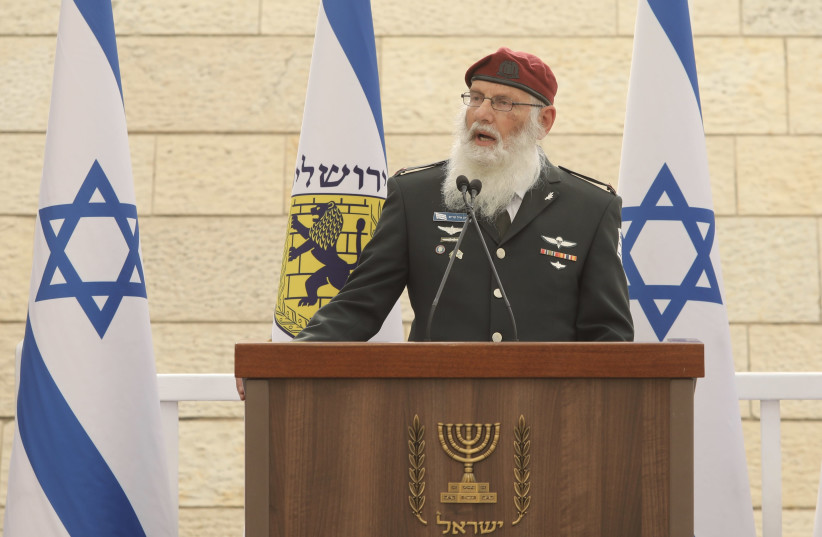Reports that the incoming government will shift the appointment of the IDF’s chief rabbi from the chief of staff to a council led by the country’s Sephardi chief rabbi circulated on Sunday. How might this impact the IDF as a whole?
A new IDF chief rabbi, who is outside the IDF’s chain of command, would have the power to tell or “order” soldiers contradictory instructions to the IDF chief. This would be in conflict with the ideology of the political party sponsoring him.
Such conflicts have already come up in the past.
IDF chief rabbis and observant soldiers have, at times, refused, for example, to evict illegal outposts when ordered to do so. Some prohibited observant soldiers from attending ceremonies where female soldiers would be singing and tried to influence aspects of how women dress in the IDF in specific contexts.
There have also been conflicts about female soldiers leading the training of male observant soldiers, even if told to avoid physical contact. In some instances, IDF rabbis have also made controversial statements against the LGBTQ community.

Finally, there are a variety of sensitive issues related to the integration of ultra-Orthodox (haredim) into the IDF, which requires a delicate balancing act, and sometimes IDF rabbis have banged heads with the IDF brass in that arena.
However, until now, if there was a conflict, the IDF chief clearly had the final say.
What has happened in the past?
A variety of rabbis have had to repudiate their controversial statements or even resign, or had their appointments frozen, knowing their hiring and firing was controlled by the IDF chief and not anyone in the political or religious class.
Under the new coalition deal, for the first time, an IDF chief rabbi may choose, or simply ignore the IDF chief.
This would undermine the IDF chief’s authority, which is at the heart of the military as a hierarchical institution that is completely dependent on a clear chain of command.
If the IDF chief rabbi could defy the IDF chief, why not other IDF rabbis and other observant soldiers? What might seem like an insignificant side issue could quickly escalate into being a fundamental threat to the ability of the IDF to function.
This is especially true given how heterogeneous and politically and religiously divided society is.
In fact, the IDF currently is one of the few last bastions of the country that has yet to be politicized and still follows one set of orders and one “set of truths.”
CHANGING THE appointment of the IDF chief rabbi is probably then an attempt by some in the political class to find the soft underbelly of the IDF chief’s authority.
They can say the IDF chief rabbi has no operational authority and hence is not interfering in how the military side of the organization works.
Further, they can point out that there have been many conflicts in the past between IDF chief rabbis and the IDF chief, even though the IDF chief appointed them.
In this narrative, some conflict between the IDF chief rabbi and the IDF chief is a built-in structural component to the IDF, given that the military is still predominantly secular, and the military rabbis are all observant.
Those who want the change can also note that a variety of top legal officials are directly involved in picking the IDF’s chief lawyer.
However, even with the IDF’s chief lawyer, the IDF chief and the defense minister have veto power.
Moreover, at least until now, Israel’s rule of law, which emerges from its secular democratic character, has supremacy in certain areas over conflicts with Orthodox Jewish rules – given that the country is majority secular.
Also, all of these arguments could just be a way to lower the threshold of the IDF chief’s authority so as to make it easier to inject politics into the IDF in other more critical areas in the future.
There are a few ways out of the nightmare scenarios.
No one has said the coalition deals take away the IDF chief’s authority to fire or suspend.
In other words, it is possible that the council will appoint the next IDF chief rabbi, but that the IDF chief can still fire him or at least prevent him from entering any IDF premises, which would make him obsolete.
Another way out is that incoming prime minister Benjamin Netanyahu could break the coalition deal since he will have established his new government before making the change.
If he decides making the change would be too costly politically with centrists or too harmful to his relationship with the IDF brass, he could just not follow through on the deal – a Netanyahu pastime of sorts.
Yet, another option would be to have the IDF chief and the council led by the Sephardi chief rabbi come to a mutual decision on the next appointment to avoid either side feeling wronged.
However, even this scenario would in some ways move the IDF chief rabbi outside of the sole authority of the IDF chief and create at least the perception of mixed loyalties.
In sum, the issue could be making a mountain out of a molehill. Yet, it could also be a case of some of the political class trying to dress up a future major strike on the IDF’s independence under the guise of a “minor” change.
